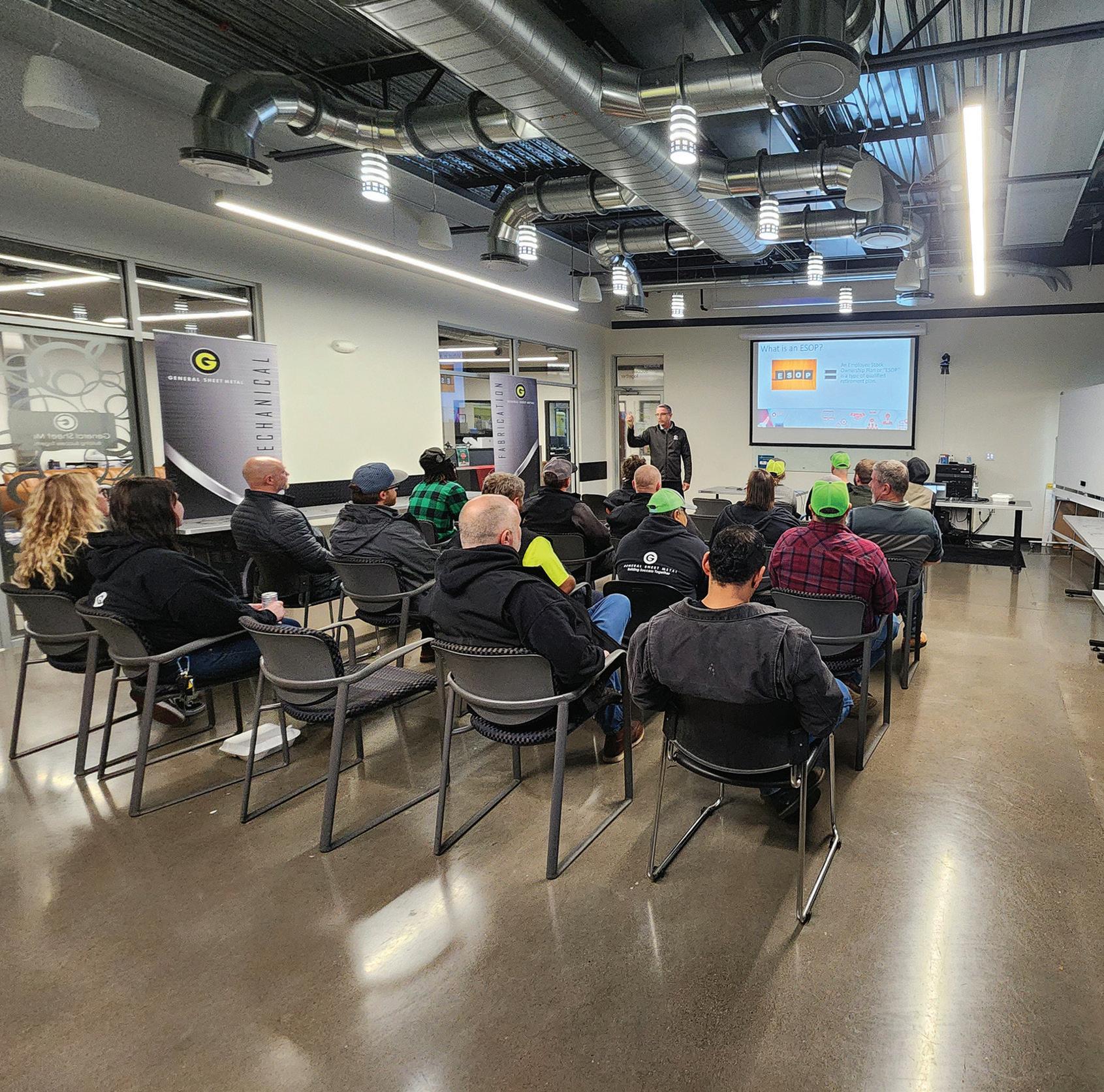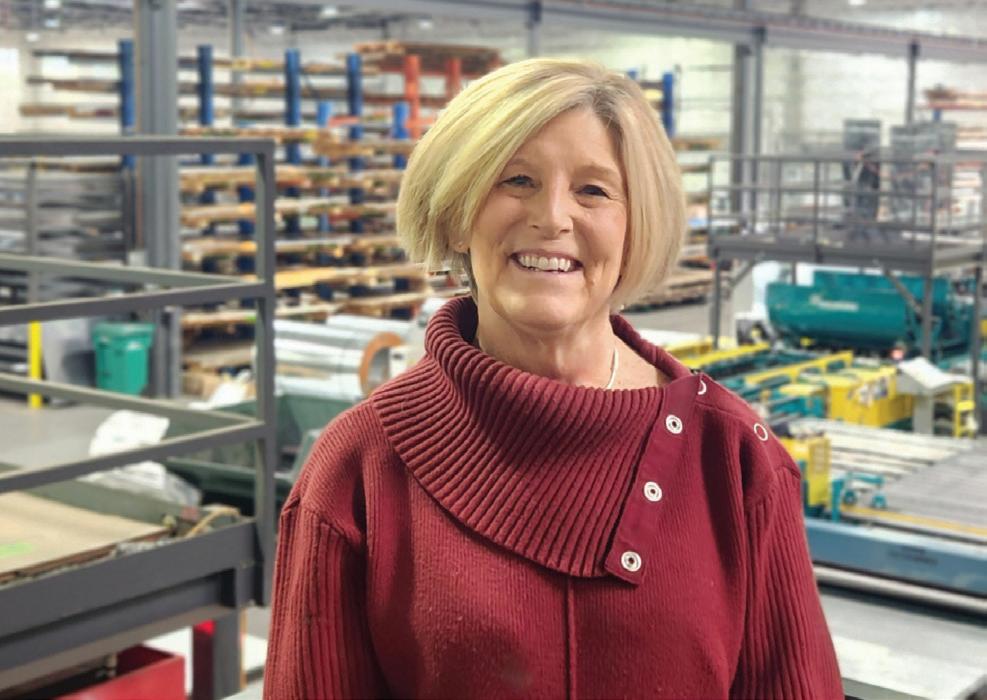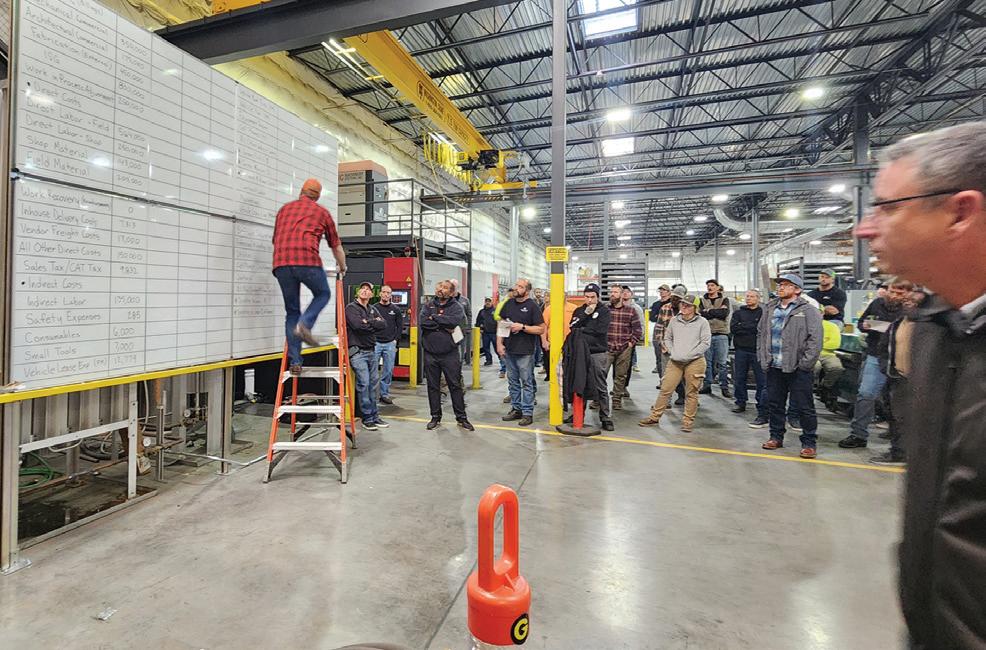
7 minute read
EMPLOYEE STOCK OWNERSHIP PLAN offers a bright future for General Sheet Metal and Local 16 employees
Oregon’s General Sheet Metal has transitioned into a Local 16 employee-owned operation, taking labor-management partnership to a new level.
By / Michael McConnell
There probably aren’t too many companies with $30 million in revenue where the person who answers the phone is also the owner. Or the person who gets visitors a cup of coffee—another owner—also pores over the company’s financial reports every week.
But that’s the case at General Sheet Metal (GSM), a mechanical and architectural contractor in Clackamas, Oregon. It’s because the company, which for decades had been a family-owned operation, is now an ESOP, which stands for Employee Stock Ownership Plan.
As an ESOP, all employees who have been at the company for a year and have met the eligibility requirements are owners in the company by means of an allocation of shares to their participant account.
Through a trust, an ESOP gives employees the chance to have an ownership stake in their employer. Unlike a 401(k) or other retirement plans where workers contribute money, with an ESOP the company acquires shares from a selling shareholder and contributes shares to employee participant accounts. The ESOP doesn’t cost workers anything.
Employees are allocated company shares based on an employer-set formula, using factors such as service length and compensation. Outside advisers determine the company’s fair market value and how many shares can be allocated. ESOP shares cannot be sold or traded. Instead, the plan outlines how and when shares are distributed or cashed in. In GSM’s case, employees can only redeem their shares when they retire or leave the company.
Employee ownership popular with workers, management
According to the National Center for Employee Ownership (NCEO), as of 2021—the most recent year with figures available—there were more than 6,500 ESOPs in the United States. They hold more than $2.1 trillion in assets, with 14.7 million active and former employee participants. Industries with ESOPs cover everything from manufacturing and retail to agriculture and construction.
Many employees like ESOPs because they offer a way to save for retirement without needing to invest their own money. And it gives workers a real stake in their employer’s success. The more successful a company is, the more value the ESOP shares have. For owners, ESOPs offer a chance to leave a legacy and retire on their own terms as opposed to being forced out after selling the business. Plus, many companies with ESOPs find employees are more committed to their jobs, reducing turnover and increasing efficiency.
Carol Duncan, CEO at General Sheet Metal, says she started thinking about the succession plan for her company after her mother died in 2016. Her family has owned the 93-year-old mechanical and architectural contractor since 1972. “When something like that happens, you start to re-evaluate your life,” she says. “I thought about selling the company, but decided that wasn’t the way I wanted to go. And so in 2018, we started looking at forming an ESOP.”

Duncan says she got the idea from SMACNA member Joe Isom of California Sheet Metal Works Inc. in El Cajon, California. He had set up an ownership plan for his employees.
However, creating an ESOP at GSM wasn’t an easy process. A board of trustees was established to oversee the ESOP trust. It hired outside consultants to guide the effort and review financial reports with accountants to determine the company’s market value, how many shares would be allocated to employees, and at what price. The framework took about six years to finalize and the process of determining market value and share allocations is repeated annually.
In 2023, the first share contribution from approximately 2 million shares of company stock was allocated to employees. All shares will be allocated among GSM’s employees over two decades.
‘Open-book management’
As part of the conversion to an employee-owned company, Duncan and other executives started holding weekly meetings where management discusses the company’s financial performance. Duncan says transparency is critical to an ESOP’s success. “That’s why we started doing open-book management,” she says. “We openly share the financials with everyone on the team and let them know what we’re forecasting for the month. And everybody has numbers that they’re working toward. So they know that it’s their money that’s on the line.”
It’s important to have frank discussions on how the company is faring, Duncan adds. “They have to see it,” she says. “I think that’s the reason why some ESOPs fail. They don’t take the time to educate and get workers involved and make them realize that they affect every number on that sheet.”
Shaun Jackson is a Local 16 sheet metal journeyperson who works in GSM’s welding department. With 11 years at General Sheet Metal, Jackson is vested in the program, which means he’s earned full ownership of his GSM shares. He has some experience with ESOPs, having been enrolled in a program at a previous employer. Jackson says he is eager to see GSM succeed.
He says he always attends the check-ins where management discusses the company’s outlook. They talk about issues such as shop and field labor costs, budgets, and expenses.
Some employees are surprised to learn how much goes into project operations, reducing the profit GSM earns. On most projects, profit margins are small. “You’re lucky to make just a few percent,” Jackson says. “It’s very enlightening to see that.”
Trevor Brown, another Local 16 journeyperson at GSM, says he isn’t surprised that Duncan wanted to set up an employee stock ownership plan for her employees. “It’s always been a family-oriented company,” he says. “She’s always taken care of her employees. She wants to see General grow.”
Brown says that initially many employees didn’t understand what employee ownership meant. So GSM held classes to explain the concept and brought in a couple of outside ESOP “ambassadors” to answer any questions workers had.

The company’s Wednesday meetings make Brown feel like he’s more than just a worker, he says. During the meetings, which are held on the shop floor, everything is laid out on a whiteboard. Workers can see where the company is succeeding and areas where it may be falling short.
Employees are encouraged to ask questions. “A regular employee like me can go, ‘Hey, I don’t understand that. Why are we doing this?’” Brown says. “I can ask those questions and they’re welcome. Employees have a voice.”
It’s different from the way most other construction companies operate, Brown adds, and it’s changed the way Brown approaches his job. “Now I’m in that mindset of an owner,” he says. “I don’t mind working hard for this company because I know they do a good job of treating their employees well. And now Carol’s said, ‘You can have a piece of this company just by working hard and being involved.’ It’s awesome.”
So far, the ESOP is doing well. Earlier this year, the company was reevaluated and the share price has appreciated by 135% since being acquired by the ESOP. Duncan points out, “I think that makes it a little more real.”
For now, Duncan is still running GSM. Her long-term plan is to retire from the company, turning operations over to her executive team.
“I’d retire now if they’d let me,” she says. “But I want to make sure that they’ve got this up and going and that it’s successful. So that’s my charge for the next couple years. There are a lot of pieces and I’m still learning something new every day. But I have no regrets about making the decision.” ▪
Michael McConnell’s experience encompasses B2B and B2C copywriting, online journalism, and newspaper reporting. The former editor of a monthly magazine for HVAC and sheet metal contractors, he’s always interested in finding out the stories behind interesting people and projects. Contact him at mrmcconnell36@gmail.com.







